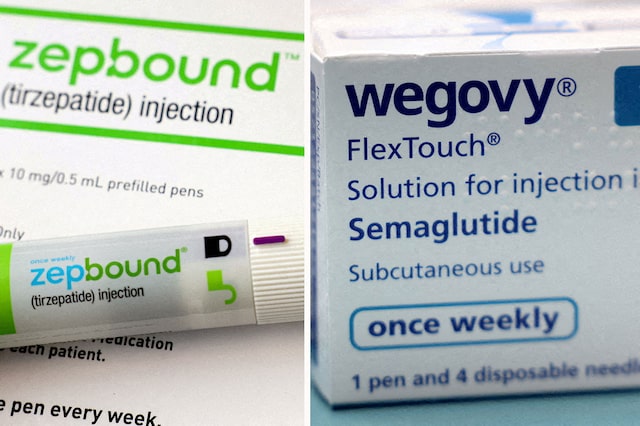A combination image shows an injection pen of Zepbound, Eli Lilly’s weight loss drug, and boxes of Wegovy, made by Novo Nordisk. REUTERS
Summary
- U.S. weight-loss drug prices exceed those in other developed countries
- Drugmakers say they support fairer cost-sharing across countries
- Some 40% of Americans estimated to have obesity
- Executive order to focus on drugs with largest price disparities, expenditures
(Reuters) – The Trump administration on Monday singled out powerful new weight-loss drugs including Wegovy and Zepbound as targets in its push to lower prescription drug prices.
President Donald Trump’s executive order demands that drugmakers cut prices on their products in the coming months to hew more closely to what they charge in other developed countries, or face new regulations and enforcement actions, from export restrictions to tariffs.
At the signing ceremony, Trump described a conversation with a businessman friend who lamented how much more expensive weight-loss treatments are in the United States.
“‘I’m in London, and I just paid for this damn fat drug I take,'” Trump quoted the man as saying. “‘I just paid $88 and in New York I paid $1,300. What the hell is going on? … It’s the same box made in the same plant by the same company.'” He didn’t name the medicine.
Injected weight-loss drugs Wegovy, from Novo Nordisk (NOVOb.CO), and Eli Lilly’s Zepbound have U.S. list prices of over $1,000 a month. For some patients, much of that cost is covered by health insurance. For those without coverage, both Novo and Lilly recently began selling their drugs directly to U.S. consumers at a cash price of $499 a month.
But with 40% of Americans estimated to have obesity, U.S. politicians and healthcare experts have urged both companies to make the treatments more affordable.
A White House official told reporters on Monday that Trump’s executive order will have “a particular focus on drugs where there is the largest disparities and the largest expenditures.”
“It would be fair to expect that GLP-1s, given that they hit both of those categories, will be a focus,” the official said, referring to the class of drugs for weight loss that Wegovy and Zepbound, as well as related diabetes medicines Ozempic and Mounjaro, belong to.
“There will be an expectation that those prices should come down, and then if they don’t, that we will be looking at our various policy levers that can be used to force those prices down.”
Lilly on Monday said it agreed that costs for breakthrough medicines should be shared more fairly across developed countries. But the Indianapolis-based drugmaker said that could only happen if intermediaries within the U.S. healthcare system, such as pharmacy benefit managers, take a smaller share of sales transactions.
Danish drugmaker Novo Nordisk said it agrees “that Americans need more access to affordable medication, and we will continue to engage with policymakers.”
Countries where health insurance is mainly provided by the government often negotiate lower prices with pharmaceutical companies. In Japan, for instance, the monthly price for a 10 milligram Zepbound injection pen is $61.68.
The trade-off is that some drugs are not covered under the government-run plans. In the UK, access to the new obesity drugs within the National Health Service is very limited, while Germany’s health plan does not cover the medications for weight loss.
“These drug pricing issues resonate for a lot of people on GLP-1s,” said Benedic Ippolito, a senior fellow in economic policy studies at the American Enterprise Institute.
Many U.S. patients had also come to rely on much cheaper copycat versions of GLP-1s made by compounding pharmacies, a practice that will soon come to an end under a crackdown by the Food and Drug Administration now that the brand name medicines are no longer in shortage.
Reporting By Deena Beasley in Los Angeles; Additional reporting by Maggie Fick in London; Editing by Bill Berkrot





